Creators, Makers, and Doers: Ghosts and Projectors
Posted on 12/12/16 by Arts & History
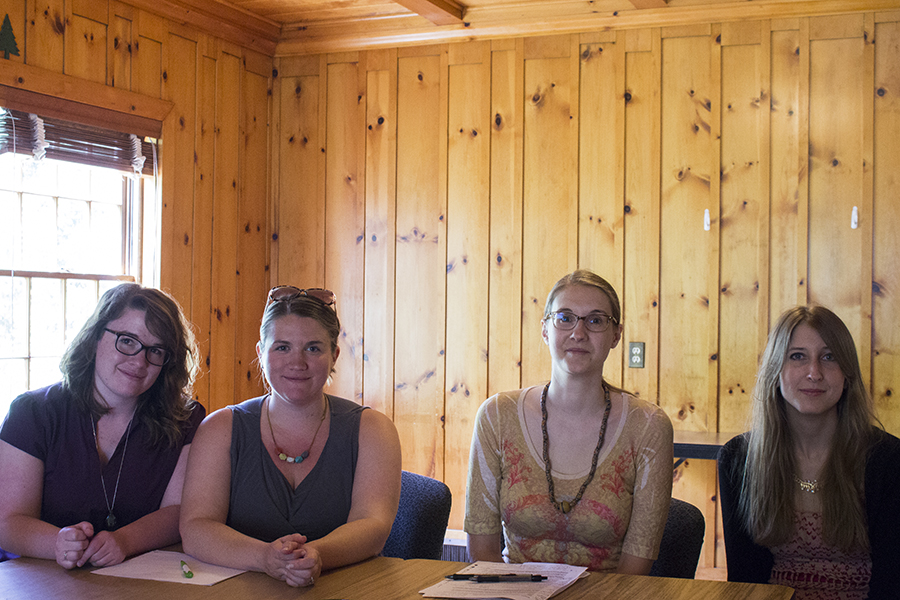
Ghosts and Projectors is a poetry reading series in Boise that helps connect local poets with others from across the country to share ideas and build a strong literary culture. According to Megan Williams, Ashley Barr, Catherine Kyle, and Hannah Rodabaugh—the women that run the show—it is more important than ever in today’s society to pay homage to language and recognize its place in examining what it means to be human. Poetry, written or spoken, provides a space for this kind of individual and communal reflection and expression. The team encourages newcomers to join Boise’s robust and generous poetry community, even if it feels uncomfortable at first. Start by attending a reading with an open mind. Know that you’ll be in a nurturing and collaborative environment among people who sincerely value each other’s work and ideas.
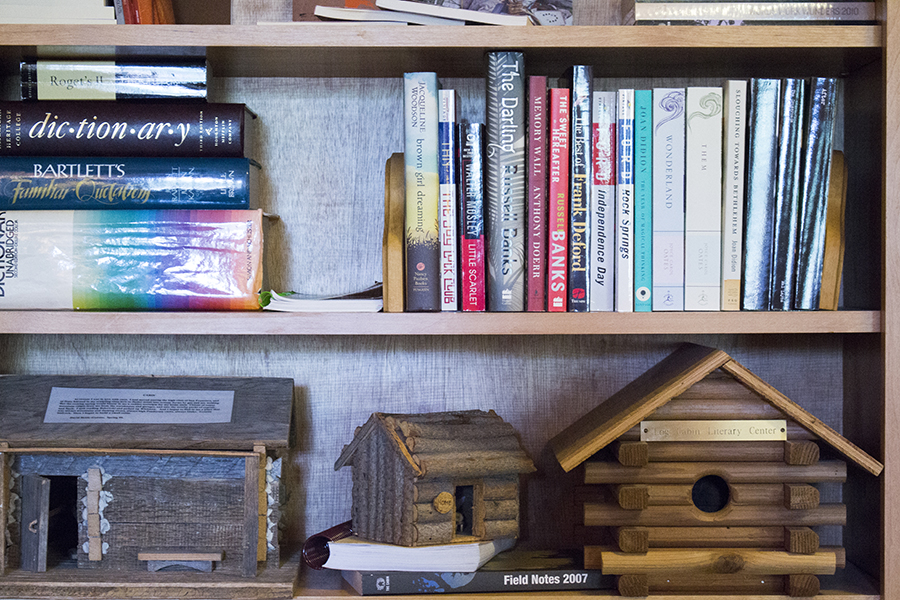
Can you start by describing Ghosts and Projectors?
Ghosts and Projectors is a poetry-reading series that aims to connect local audiences and local poets with poets and writers from across the country. So, more established writers or emerging writers come into town and read with local poets.
Is the main focus poetry or does it include fiction as well?
It’s mostly poetry. We’ve had writers of all sorts read for the series, but the focus has definitely been poetry.
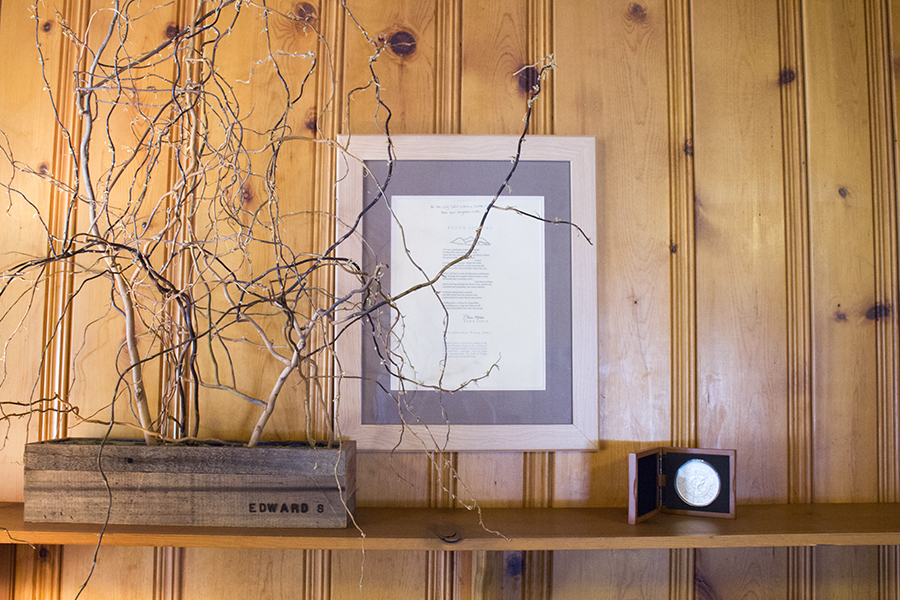
Why poetry? What is appealing about poetry?
This is always a really difficult question. Poetry is beautiful ideas expressed beautifully. Or sometimes it’s like ugly ideas expressed ugly. But it’s not just about content; it’s about language. The language becomes a form of content. In prose you don’t really do that. Poetry, oftentimes it frees you from narrative. Whether it’s creative nonfiction or fiction, an audience has certain expectations. It’s a really different mode of thinking about ideas or about trying to tell a story with a poem, you will express that in a really different way. Not necessarily in a linear way. It just accesses a really different part of the brain. Poetry compared to a painting versus a fiction piece as compared to a movie—they’re both great, they’re all great, but sometimes you just want to distill a certain memory or a certain image and poetry can do that in a way that fiction and nonfiction don’t. In fiction you’ll need a character to make an excuse to say this thing. That takes so much time and it’s really about telling the truth. The story isn’t necessary to tell the truth. There’s that space in the play with language that allows you to kind of start playing with thoughts or ask questions.
Poetry is mostly important because it creates a space for a community to happen, so poetry is like a really solitary art a lot of the time. And it can get more and more solitary. Ghosts and Projectors provides the space to meet and work with other poets or people who are interested in poetry within Boise. For all poetry communities, poetry readings are full of poets who are gung-ho about readings. We know that poetry doesn’t appeal to everybody, so we feel like, if we want community, we have to make it. And that’s how the community gets made.
Encountering a poem in a reading is a different kind of experience. It can be a transformative experience to encounter a poem read out loud, almost more akin to encountering music. Attending poetry readings, you can hear the poem as delivered by the person who wrote it, and sometimes that can totally change your attitude towards a poem. Also, different poets have different philosophies on doing this, but when a poet will give a little bit of context to their process in writing a poem or something that was going on in their life when they wrote a piece, that can also enhance your understanding of it. So, that’s a great part of readings that you don’t always get from just that solitary act of reading the book.
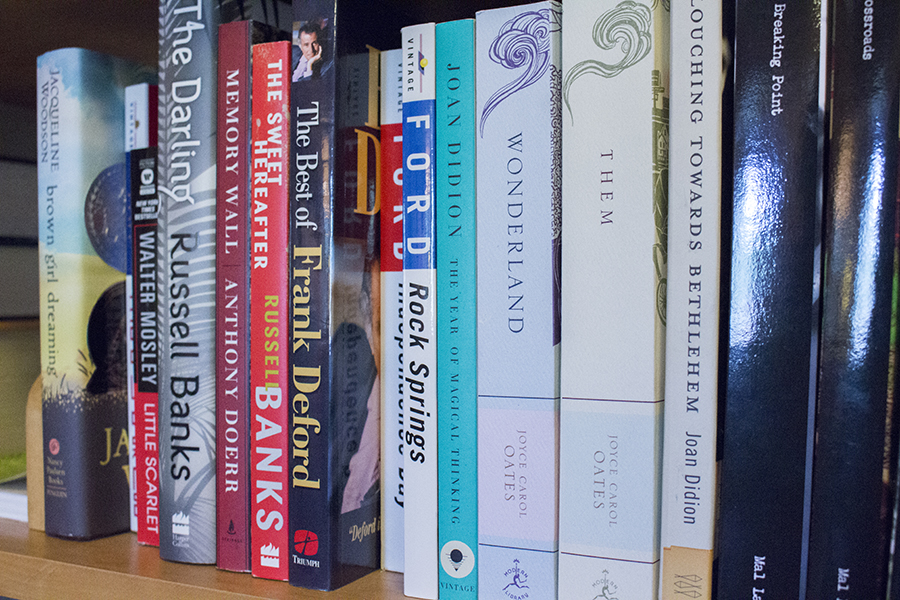
Can you articulate the importance of poetry in today’s society?
Language has been so watered down and become so formulaic in the age of social media where you have people who are writing blogposts with literally lists of headline formulas that are guaranteed to get the most clicks. What that’s done to language has been very, very interesting, and that’s a word without positive or negative connotations. Poetry gives a space where language can have meaning again and be important again and be considered. Even if, or especially if, it’s negotiating the watered down language of social media, click-baiting, or the relationship between content-making and speech language. Just speaking of social media, there’s a lot of superficiality as well. Poetry has a type of emotional honesty, a personal truth, it searches for societal truth, or something like that. It’s not just a sound bite but it’s something that somebody has thought about for a very long time and articulated in a very conscious way—not just dashed off in a YouTube comment box. Yeah. It’s depth. We often think of poetry as being very spontaneously written and sometimes it is and sometimes that can be great. But there are also a lot of writers who really, really think about what they’re saying before they write it down. It’s a conscious and emotional effort.
Art is about understanding what is human in us. We human beings need a space to figure out what it means to be a human, and that’s what the arts are. We all need that as a culture. We need that space, even if we’re not personally invested in it. Like, Bill, the regular dude with his house in the foothills, even if he’s not in arts or connected to the arts community, it’s important for arts to exist, because somewhere you need a space to reflect on what it means to be human. And then poetry’s just the language equivalency of that.
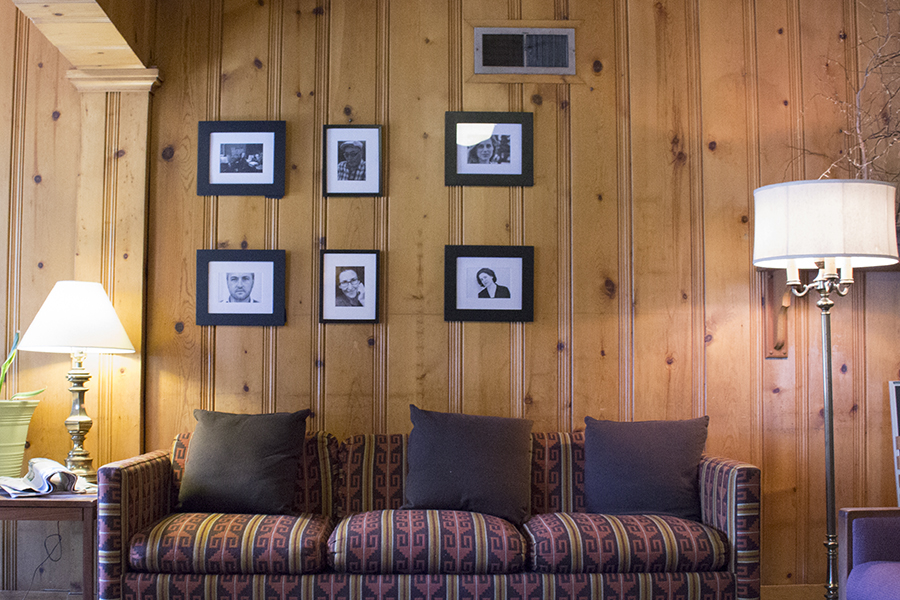
How many readings do you put together for a year?
It depends. We aim to put on four or five that we plan and invite the poets to. But we also are point-of-contact for a lot of poets who are touring, so presses will contact us or individual poets will contact us, and when that happens, we almost always at least try to throw those people into the mix. So, this season will be more like five or six.
What could someone from the public expect to find at one of these readings? How could you describe their experience?
Well, typically, we say the start time is seven, and then, as with poetry readings and literary events in general, that’s about fifteen minutes late. But it’s good to come at seven. You can get a glass of wine or a drink, see some people that you know, meet some people that you don’t know. The poets who are reading will probably be milling around, looking very anxious sometimes. We hold the events, sometimes at Ming Studios and sometimes at The Cabin. We’ve held them at different bars as well in the past. So, usually you’ll find seats, so people will start moving towards those. Sometimes there’s a projector set up. Some poets project, which is just name-appropriate. Once it starts, you have to come open to the possibility of being surprised or being frustrated that you don’t get something or being delighted that you really do, because every poet brings something different to a reading. So, there’s not really one set thing. It’s just, come prepared to be surprised.
We usually try to have at least… two people—usually more—three, sometimes even four, people on a reading. So they each read for fifteen or twenty minutes. And it’s really interesting because we put thought into who to pair and look at parallels in their work. Oftentimes these people have never even met each other, maybe even not read each other’s work, but we have, and it’s interesting to think about connections. You’re not just going to see one person, but you’re going to see a collage of artists.
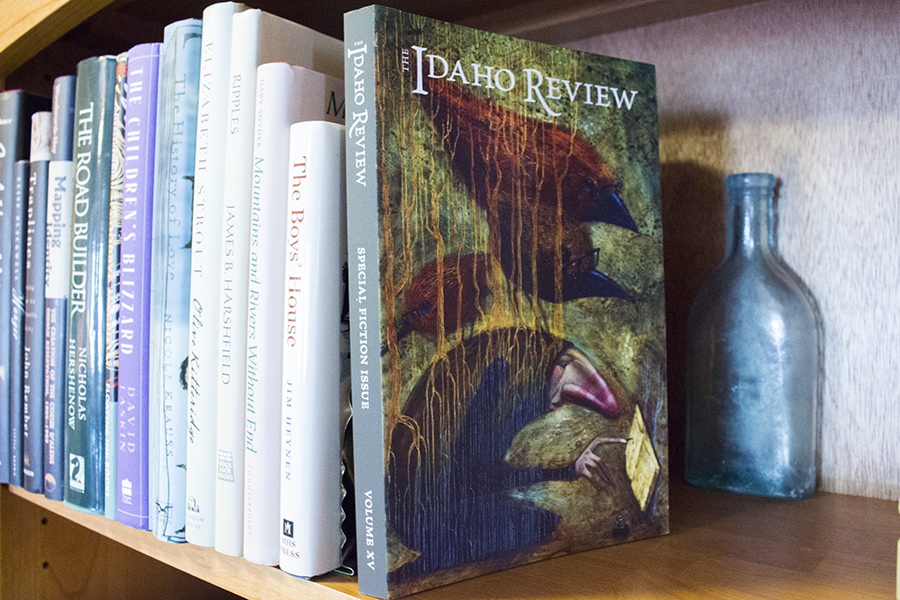
Is Ghosts and Projectors a model that works for Boise or is the model something that exists elsewhere?
There are other reading series that are akin to Ghosts and Projectors in cities that are larger. We have turnout at Ghosts and Projectors than you can’t get at our reading series in New York, because there is so much going on. And thinking about cities that are similar size to Boise, like Buffalo, New York, Ghosts and Projectors and something similar would do fine in Buffalo, but they are also a very literary city. In some ways, the connective work that Ghosts and Projectors does is specific to the kind of communities that arise in Boise. We have a really strong slam scene, and then we have the MFA program and we have writers at the College of Idaho and some cowboy poetry.
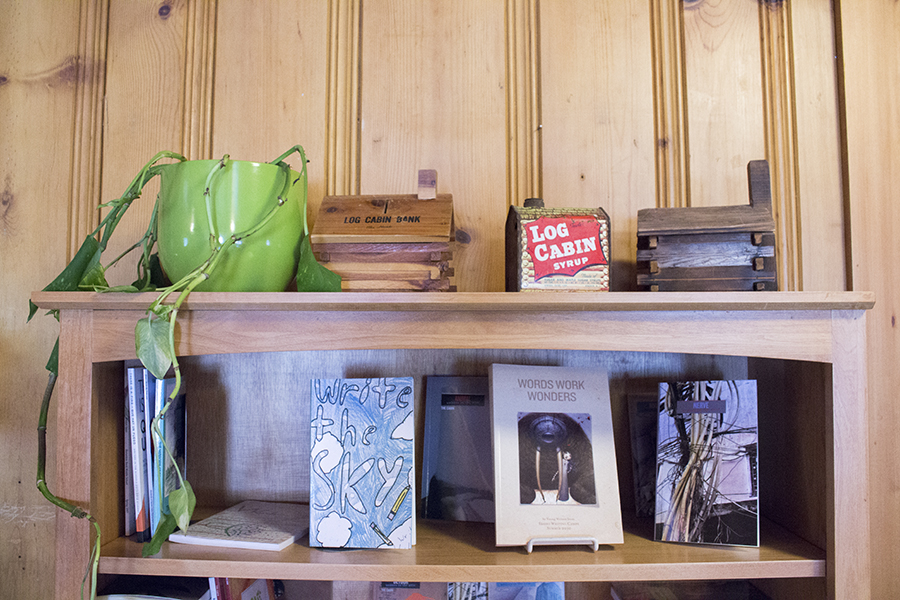
What is the general state of the literary community in Boise and the Treasure Valley?
It’s doing really well. It’s super strong. Yeah, I think it’s great. We’ve all lived in lots of other places, and we have a fantastic literary community here. The first part of that is there are obviously a lot of writers here, a lot of writers of different genres, but also the community is a true community. People really want each other to succeed. There is a lot of collaboration. There’s a lot of generosity and inclusivity that is extraordinary. Other places don’t always have this kind of community, and honestly, because it’s Boise and we’re in the middle of nowhere, we’re not in Manhattan. There’s not pre-made culture, so there’s a real kind of DIY sense to the community. They’re really interested in starting things and saying, “If we want culture here, we have to make it ourselves.” So, everybody in the poetry community or just the writing community at large is really invested in the community. They’re really emotionally invested in the community. There are so many other reading series in town and writers are always saying, “I’m just going to start a new reading series,” like, the Death Rattle, which just happened. We’ve got a new festival. A new writing festival. People are just starting community-based literary projects all the time in the community and keeping it vibrant. It’s blown up in the last five years or so. We hear of a new project every couple months, somebody’s put something together, and—it’s awesome. There’s so much to go to that you can’t go to everything. You get overwhelmed. That’s not a problem. It’s a good thing. It’s a great thing. Embarrassment of riches.
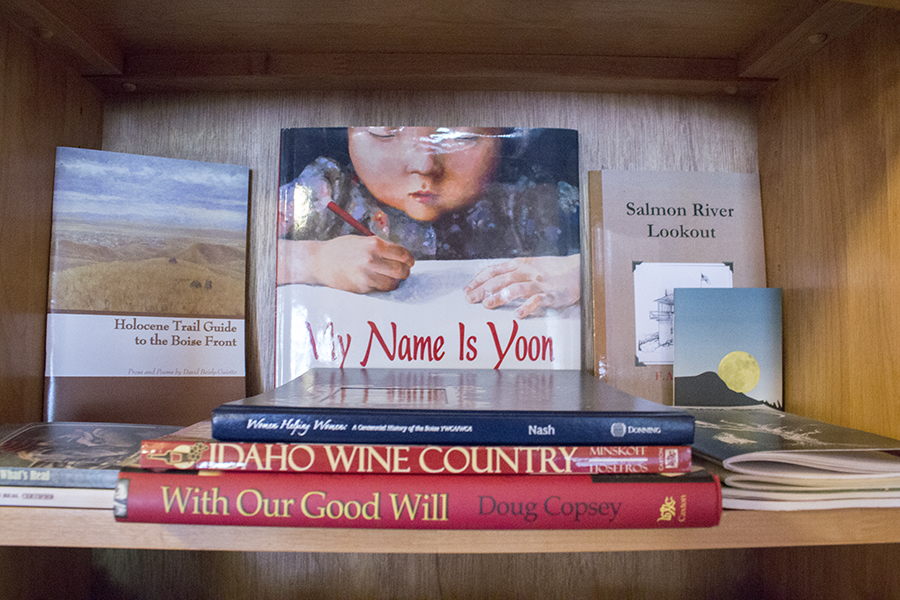
What resources are missing in the area that would help Ghosts and Projectors be more successful?
Venues. We’ve been doing Ghosts and Projectors for a while and we’ve bounced around quite a bit because there’s not a lot of stable spaces to hold readings. That’s the biggest challenge for any reading that you organize. One of the things about the embarrassment of riches, it’s great we have so many reading series and community events that are popping up, but then also we’re competing for the same spaces to hold the events in.
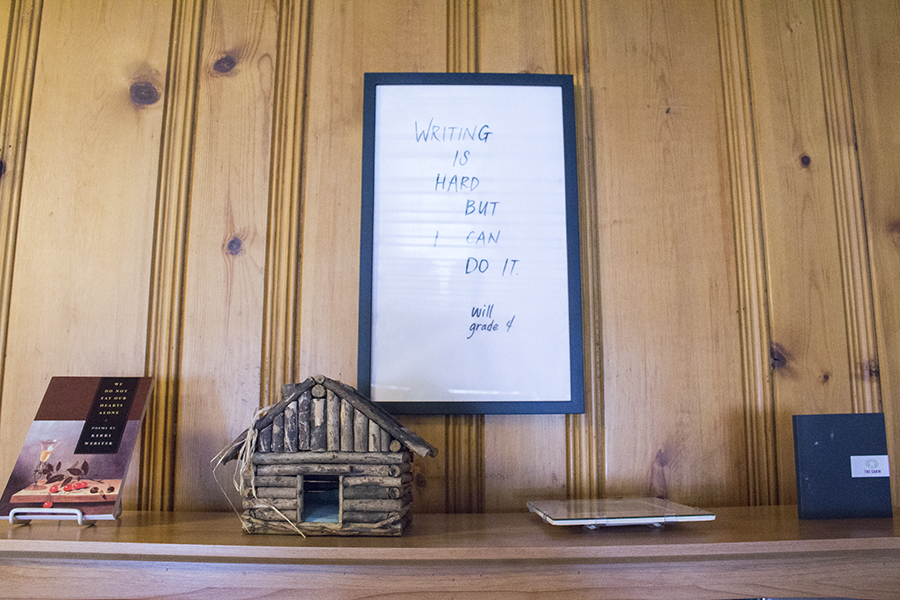
Finally, any words of advice for other poets?
You’re in the right city. Come to readings and then talk to us, even if it’s uncomfortable. We’re all introverts. All the other artists in Boise that I’ve met want other artists to succeed and to thrive in a really unique and beautiful way. And, so, it might be intimidating to ask somebody to swap work with you or something like that, but I’ve had nothing but good experiences. I find this to be a really nurturing and great place to be an artist.
If you want to get something from your community, you have to give back to it. If you want people to go to your reading, you have to go to other people’s readings. You can’t just expect to take and take and take. It has to be give and take. You have to be willing to give back to the community that you’re part of and is giving things to you. You never know what you can get until you’re making yourself a part of it and actually giving something to the community. Because you give back to it, you make connections that become opportunities in the future, writing opportunities that allow you to take things from the community. Intellectual opportunities, too.
Creators, Makers, & Doers highlights the lives and work of Boise artists and creative individuals. Selected profiles focus on individuals whose work has been supported by the Boise City Dept. of Arts & History.